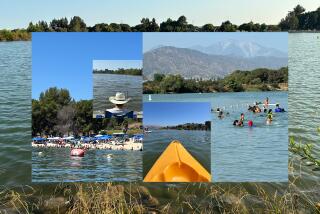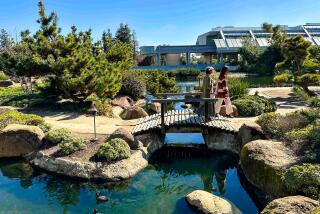Delight of the Lake District
- Share via
ON ULLSWATER LAKE, England — It’s virtually impossible to find a written reference to England’s majestic Lake District without the obligatory mention of poets and inspiration. Yet before the British became enamored of this region, the craggy mountains seemed so fearsome that travelers pulled down the shades of their carriages while passing through, and ghostly legends abounded of spirits dwelling in the wilderness.
But in the 1800s, William Wordsworth’s writing anointed this group of 16 lakes in Cumbria as England’s premier tourist spot. The best-known lakes--including Grasmere, Wordsworth’s home--still draw hordes to this area of northwest England in summer. Classic arched bridges near Derwent Water lure artists and photographers. Windermere, the largest and most southern lake, draws everyone from day-tripping grannies on tour buses to dare-devil windsurfers in thick, shiny wetsuits.
I’ve been to the Lake District at least a dozen times, and I’ll take untamed Ullswater in the north. Cloyingly cute Beatrix Potter-ville may be just a few miles south in Near Sawrey, where the author lived, but relatively ignored Ullswater calls to a spirit willing to search out the paths and hills less traveled--and, perhaps, a spirit that prefers a decent Sauvignon Blanc and a cheese souffle at dinner to a pint of lager and a plate of fish and chips.
Pristine and decidedly non-gimmicky, Ullswater is the area’s second largest lake. But more importantly, it is considered by those in the know to be the most beautiful body of water in Britain. That’s saying a mouthful in a country of perfect landscapes. Tucked away on Ullswater’s shores are a handful of England’s best country-house hotels, including Leeming House, set in a historic manor, and award-winning Sharrow Bay, an epicure’s mecca.
But the weather is unpredictable, and the memory of our initial trip to Ullswater 12 years ago remains somewhat murky. From the moment we arrived, a gray-flannel fog blanketed the lake. Willow and beech trees dripped heavily with mist. Thick grass along the sweeping shores lay sodden, squish-squishing each time we’d attempt to walk along the water’s edge. For this we drove 295 miles from London, I thought?
Moving in this vaporous haze for three days--keenly aware that some of the most glorious views in Britain were just outside our door--we found our patience was eventually rewarded when the clouds lifted and an Eden of towering peaks and sheep-studded fells was revealed. In the brilliant August sun, the extreme dampness heralded an almost violent renewal of nature, where even the moss took on a vibrant hue--the green of emeralds.
Thought to have been named for a Norse conqueror named Ulf (hence, “Ulf’s water”), the lake is 7 1/2 miles long and three-quarters of a mile wide at its broadest, surrounded by air that is sharply clean and hills easy enough to climb. Though some days it seems undiscovered--we recently traipsed for miles and never passed another soul--an estimated 500,000 trekkers of all ages navigate the surrounding paths and fields each year. Literally hundreds of miles of public trails thread through the Lake District National Park’s 866 square miles, much of it protected by Britain’s National Trust. The Cumbrian landscape comes with its own dialect: Streams are called becks, mountain pools are tarns, mountain ridges are fells. The colors of the day can change abruptly; thus the need for umbrella and “suitable footwear,” as the British Ramblers’ Assn. guidebook aptly states.
Around Ullswater, fell walking is a trifle more challenging than at some of the other lakes, but like the rest of the county’s paths, there are adequate gates and stiles with no need to climb a precarious stone wall to get where you’re going. (Simple maps are available at shops and at the visitors’ centers in the villages of Pooley Bridge, on the north end of the lake, and Glenridding, on the south.) A tangle of rough fells to the southeast lends it an unruly beauty, and the landscape quickly changes from rolling to wicked.
Wordsworth saw the daffodils that inspired his poem known by the line, “I wandered lonely as a cloud” at Gowbarrow Park, on Ullswater’s north side. Hallin Fell, easily climbed in the south, has some of the best views. The hilly Helvellyn range, in the southwest, and Place Fell, on the east, are also breathtaking. Among the best walks is one we like to take that traces the wooded eastern shore, with naturally terraced paths and lush ferns leading the way.
*
One of the most indisputably romantic spots in the entire Lake District is Aira Force, a dramatic waterfall tumbling 70 feet between slick rock walls before flowing into Ullswater on the west side. The site of a mythical tragedy, it continues to lure couples to its tiny bridges, high above the ravine.
The heroine of this tale, as told in British guidebooks, is a girl named Emma, who lived in the nearby tower and was gaga over a knight named Sir Eglamore. Alas, the knight abandoned her and, in despair, she began sleepwalking beside the waterfall, their former trysting spot. One night, Sir Eglamore, coming upon Emma at Aira Force, called out her name. At the sound of her true love’s voice, she awoke suddenly, tripped and plunged to her death. Unable to overcome his grief, the knight became a hermit, living near the spot where she died.
For present-day romantics, there’s a convenient parking lot a short walk from the falls, and a leafy stroll along a shaded path under towering oak, ash, alder, willow and beech leads to the thundering waters.
Angle Tarn is a small lake at the southern end of Ullswater. It has its own beauty, with two tiny islands resting peacefully in its trout-filled waters and the peaks of Angletarn Pikes rising behind. Herds of red deer, from the nearby Martindale deer preserve, drink at its shores. Shy fen ponies, as wild as the deer, also make dawn and twilight appearances at the water’s edge.
Littered with cairns, standing stones, stone circles and pits--all dating back 3,000 to 4,000 years--Moor Divock is a wide, windblown plateau off Ullswater’s northeastern shore. We wandered around its odd stone relics and crisscrossed its paths of spongy turf and concluded that Moor Divock is a fine walking area.
*
The sublime reward for roughing it on the fells by day is to relax in style at one of Ullswater’s luxurious little hotels at night. We were first pointed in the direction of Sharrow Bay Country House not by enthusiastic magazine reviews or laudatory ratings (though it has garnered its share, including those from Michelin and Egon Ronay) but on the recommendation of a discerning friend.
“I’d say it’s the best country-house hotel in England,” he matter-of-factly stated.
Though a healthy smattering of elegant inns have sprung up in the ensuing years, the 12-room Sharrow retains a lofty position, not just for its cuisine, but for one of the best views of any inn in Britain; the waves of Ullswater actually lap its gray stone terrace walls.
Built in 1840, the main house’s exterior is decidedly non-British: an unassuming little villa that might look at home in the Italian lake region. But step inside and everything’s as British as treacle tart, with a soft decor that relies heavily on Victoriana and chintz. Guests are actually housed in several locations, including the main house, a guest house on the grounds, a garden cottage, the bank house (a beautifully converted Elizabethan farmhouse situated one mile from the hotel) and at Thwaite Cottage, four miles away in the tiny hamlet of Tirril.
A member of the Relais & Chateaux hotel group, Sharrow has been run for many years by its genteel proprietors, Francis Coulson and Brian Sack. The staff, some of whom have been with the hotel for 25 years, demonstrate genuine concern for the comfort of guests.
We’ve stayed there three times over the last decade, the most recently being last July. We would have returned more often, but in summer it’s often booked solid, making it essential to reserve well in advance--even if you’re just going for a meal in one of its two dining rooms. Among the pleasing touches are the muted colors of fabrics and the rhythmic ticking of the hall clock. (The restroom is politely referred to as “the powdery.”)
Sharrow’s cuisine--it might be described as French-inspired British--is also in a class by itself, with dinners that are five-course affairs. Consider these examples from our dinner menu last summer: traditional roast grouse, loin of Lakeland lamb with a chicken and apricot mousseline; filet of brill (a light fish) with lobster salad. Desserts were heavy on the creme fraiche and homemade vanilla ice cream, so if you’re watching your cholesterol, make sure this extravagant kitchen has advance warning. (As a non-meat eater, I found the chef accommodating and inventive at mealtimes.)
*
Almost directly across the lake at Watermillock, luxurious Leeming House sits prettily in 20 formally landscaped woodland acres. The main house, with 39 elegant bedrooms, was built in the early 1800s by a wealthy landowner. Dozens of trees from around the world were imported by the arbor-loving owners, with most still gracing the gardens.
Converted into a sumptuous country house hotel in 1969, Leeming House is now run by the Forte Grande group in refined, efficient style. Room service at breakfast (on dainty Wedgwood china) arrived in a record-setting four minutes. They’ll offer to wash your car for you, hire a chauffeur-driven Daimler for sightseeing, pack a gourmet picnic for walking the fells.
Though the atmosphere is not as grandly impressive as Sharrow’s, men are still asked to don jackets and ties for dinner. From a menu that changes daily, I had a marvelous ragout of Scottish scallops, salmon and prawns in a basil, tomato and yogurt sauce. Despite the hotel being fully occupied during our visit last summer, our room, with four-poster bed and perfect lake views, was as quiet as a chapel.
(The same warm words cannot be lavished on Rampsbeck House, another country house hotel located almost next door. We spent two nights there, after reluctantly vacating Leeming House due to another guest’s standing reservation. An attractive 18th century home also fronting Lake Ullswater, Rampsbeck has 19 guest rooms. But though their brochure boasts “warm and friendly, courteous service,” we were greeted at check-in by a woman with a demeanor not unlike headmistress Maggie Smith in “The Prime of Miss Jean Brodie.” The woman’s sniffy attitude only increased when I requested a room with a view, and I thought she was going to send us to the principal’s office when we declined dinner in the hotel’s overpriced dining room. After passing an uneasy night in a drafty room, we were awakened not by the trilling of birds but by clanging sounds of pots and pans in the downstairs kitchen.)
*
Anyone is allowed to launch a boat on Lake Ullswater, but its tranquillity is protected by diligent lake wardens. (Anglers will find trout, perch and schelly, a fish found only in these waters.)
The visitors’ preferred method of experiencing this peaceful ebb and flow is to hop aboard a beautifully restored 1889 steamboat, the Raven, which departs from Glenridding and stops at various points. (A circle tour, April through October, takes about an hour and costs $9 for adults, $6 for children.)
Yet the area has more to offer than knockout views. Penrith, the nearest town (nine miles away), was an industrial center in Victorian times and now boasts great antique shops and local pottery designers. (During one wet afternoon, I combed the secondhand stores for Victorian jewelry, scoring an heirloom cameo brooch and gold-and-amethyst ring at costume-jewelry prices.)
Dalemain House and Gardens, a splendid mansion with a Georgian facade, is open April through September. Owned and occupied by the Hasell family since 1680, parts of the current house are a glorious confusion of twisted passages, unexpected staircases and secret rooms.
There’s a striking contrast between the lovely 18th century rooms downstairs (particularly the Chinese drawing room) and the dark oak Jacobean paneling on the second floor. The park-like gardens are particularly designed with a child’s curiosity in mind, and the proprietors delight in catering to them. Lunch and afternoon tea can be enjoyed near a big log fire.
But when my thoughts return to Ullswater, it’s walks in the wild fells that I remember.
One summer day a few years ago, while wandering the southern end of the lake, we happened upon a narrow, serpentine road that led through a low mountain pass. It opened onto what we now refer to as our secret valley, a rolling green version of heaven on Earth. Descending into this picture-postcard scene, we followed the river for about a mile and noticed a chipped plank with the hand-lettered message: “Tea: 3 miles.”
Driven by thirst and curiosity, we hiked on. At the farm, a flock of bleating sheep was being shorn in the corral, stripped of their woolly coats in a matter of seconds. Pushing open a wide gate, the farmer’s 10-year-old daughter sat us down at a rough outdoor table. Shyly pouring the steaming tea from a brown earthen pot, she sliced thick slabs of lemon cake from a still-warm loaf, explaining that she was in charge of refreshments because her parents were both “working with the lambs today.” The year could have been 1940, even 1840, and for a moment, it seemed a perfect world.
(BEGIN TEXT OF INFOBOX / INFOGRAPHIC)
GUIDEBOOK
Lake District Lodges
Getting there: American, British Air, United and Virgin Atlantic fly nonstop from LAX to London. Advance purchase, round-trip fares start at $680. From London, it’s about a 300-mile drive to Ullswater. Take the M1 highway north to the M6 to the Penrith exit (indicated as Junction 40 on some maps). From there it is five miles to Ullswater.
American, British Airways, Continental and Delta fly from LAX to Manchester, with one change of planes. Advance-purchase, round-trip fares start at $870. From Manchester, it’s about a 100-mile drive to Ullswater. Take the M6 north and exit at Penrith (Junction 40).
Where to stay: Leeming House Hotel, Watermillock, Ullswater, Near Penrith, Cumbria CA11 OJJ, England. Rates: about $210 to $250 per room per night, including early morning tea; $15 extra per night for rooms with views of the lake. Special rates are available for dinner, bed-and-breakfast packages; from the United States, telephone 011-44-1768-486-622; fax 011-44-1768-486-443.
Rampsbeck Country House Hotel, Watermillock, Ullswater, Near Penrith, Cumbria CA11 OLP, England. Closed January and February. Rates: about $160 to $285 per night, double occupancy, including full breakfast; tel. 011-44-1768-486-442; fax 011-44-1768-486-688.
Sharrow Bay Country House Hotel, Lake Ullswater, Pooley Bridge, Penrith, Cumbria CA10 2LZ, England. Closed December, January and part of February. Rates: about $160 to $300 per person, double occupancy, including gourmet dinner (wine is extra) and full breakfast. Cash or personal checks only; this hotel does not take credit cards. tel. 011-44-1768-486-301; fax 011-44-1768-486-349.
For more information: British Tourist Authority, 551 Fifth Ave., Suite 701, New York, NY 10176-0799; (800) 462-2748 or (212) 986-2200, fax (212) 986-1188 or (800) GO2 BRITAIN.
More to Read
Sign up for The Wild
We’ll help you find the best places to hike, bike and run, as well as the perfect silent spots for meditation and yoga.
You may occasionally receive promotional content from the Los Angeles Times.






